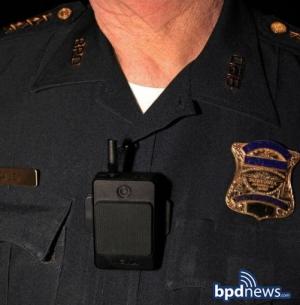March 12, 2017
 Body-worn camera pilot: Program to be extended for six months under deal with BPPA.
Body-worn camera pilot: Program to be extended for six months under deal with BPPA.
Mayor Martin Walsh and Boston’s largest police union have agreed to extend the city’s ongoing body camera pilot program for another six months. The mayor and Police Commissioner William Evans say that the program, which was due to expire this month, needs more time for the city to gather “sufficient data” to judge its effectiveness. The Boston Police Patrolmen’s Association (BPPA)— which initially opposed the program when it was rolled out last year— has decided to join the push for the six-month extension, though some advocates question the need for it.
“This extension is a positive development and I look forward to continuing to build on the success of this pilot program,” Walsh said in a statement to the Reporter on Sunday. “We are fortunate to have one of the best police forces in the country and our officers work hand in hand with the community to make all neighborhoods safer. I thank Commissioner Evans and the BPPA for their continued willingness to work together on this initiative.”
The initiative got off to a rocky start last year when, after a call by Evans for volunteers to wear he cameras, no officer stepped forward. The commissioner then ordered cameras to be deployed on 100 officers selected at random. Evans’s ruling was challenged in court by the BPPA, but a judge ruled that Evans had the authority to make the cameras mandatory.
This agreement will mean that patrol officers currently equipped with body cameras will continue to participate in the pilot program, the mayor’s office said, with the pilot now scheduled to end on Sept. 11, 2017. “If necessary, replacement officers will be trained and assigned by the Boston Police Department,” the statement read.
The city will also fund a “independent analysis” to allow for “a more comprehensive review of the available data, comparisons of body worn camera technologies and vendors and best practices for the BPD.”
Last year’s court proceedings resulted in a late fall start to the pilot, so police have not assessed the cameras’ effectiveness during warmer months, when the city often sees spikes in crime. “I am pleased that the pilot program will be continuing through what tends to be our busiest months of the year,” Evans said. “Extending through the summer will give us the opportunity to keep the body- worn cameras out in the community and will provide additional data to assist with the assessment of the program. I would like to thank Mayor Walsh, the union leadership of the BPPA, and the officers who are participating in this pilot program for their continued commitment to exploring this new policing tool.”
Advocates for body-worn cameras had pushed for the pilot to end with a decision to make the cameras a department-wide order. The Boston Police Camera Action Team (BPCAT) released a statement in January calling the camera’s use “a common sense issue, and one on which the people have already spoken.”
Segun Idowu, co-founder of BPCAT, told the Reporter on Monday that the group’s objection stands. “Extending this to get more data for a program you’re already calling successful doesn’t make much sense to us,” he said. While Boston touts its status as an innovative, progressive city, Idowu said delaying a full rollout will put the city considerably behind other municipalities committing to a comprehensive body camera program. He further asserted that the extension, which pushes the pilot completion to later in an election year, appears to be a “placating” move toward the police union.
It is not yet clear how much the extension will cost the city. The Walsh administration budgeted $500,000 in the most recent budget to pay for the deployment, and some grant money has been provided for the pilot from the state’s Executive Office of Public Safety.
City Councillor Andrea Campbell, who leads the council’s committee on public safety and criminal justice, said that the cost of outfitting the 2,000-plus-member BPD force with cameras could start at $3 million. “I applaud the administration, the BPD, and the union for extending the body camera pilot program,” Campbell said in a statement on Monday. “Extension into the warmer months of the year will give analysts a larger sample of data to work with, allowing for a more accurate portrayal of what a fully implemented program would look like for Boston. I look forward to a post-pilot hearing to review the analysis.”
With the extension agreed to, Idowu said BPCAT and other advocates will continue to focus on an eventual body camera policy. “The whole push has been about policy, not the cameras,” he said. “The cameras will be here no matter what. This is an issue that’s not going away, and that the policy better be 100 percent of what we all put together, because it protects the officer and it also protects the community.”
Topics:
Tags:


